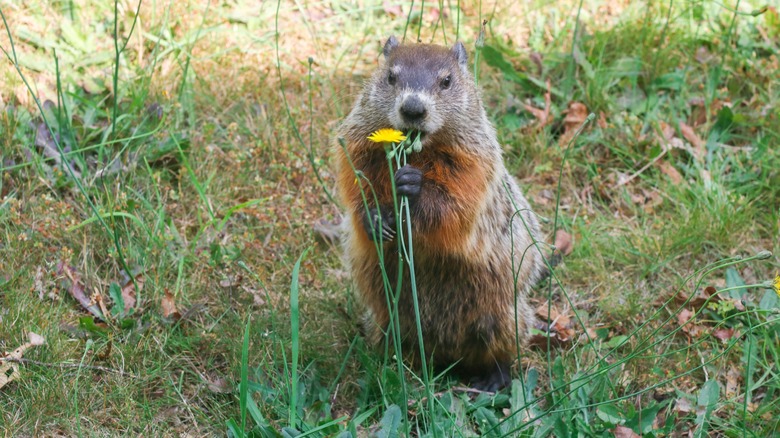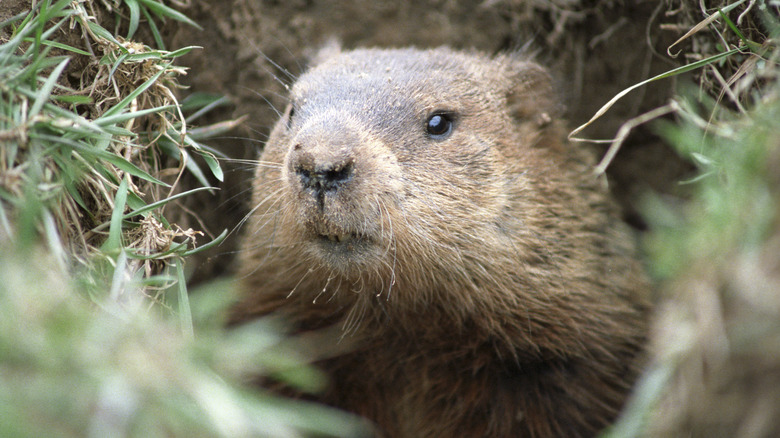Can The Smell Of Cinnamon Really Keep Groundhogs Away?
Groundhogs might look innocent at first glance, but they can cause a lot of damage to your yard. They busily dig trenches all day long, moving large amounts of dirt and rocks to create their burrows. This is worrisome for two reasons: First, the holes ruin the appearance of your lawn, making it look excavated rather than meticulously groomed. Second, it can create real structural damage, especially if these furry critters dig too close to your foundation or underneath your porch or pool. Their trenches can weaken the base, allow water to seep inside, or potentially cause cracks to form. Because of this, you will want to get rid of woodchucks as soon as you see them. And since most people try an at-home remedy first before calling in the wildlife experts, there are a ton of DIY pest control options out there. One of the most popular ones is to use cinnamon to scare them off your property, but does it really work? The answer is a bit layered, but not really.
While groundhogs don't like the pungent smell, it's not strong or irritating enough to convince them to leave their burrows and move to a different location. Generally, they dislike spicy smells since they irritate their sensitive sense of smell, but cinnamon isn't as potent as say cayenne pepper. Here is why you should skip cinnamon the next time you see a groundhog digging in your yard and what to use instead.
Why cinnamon isn't an effective repellent
Cinnamon is often touted as an easy way to repel groundhogs, but there isn't any scientific data to back up this claim. Secondly, there isn't much anecdotal evidence, either. This hack might have been suggested because cinnamon is often used to repel other household pests, such as garden moles or rats. However, while they may be effective with those critters, they're also not foolproof. For example, according to trusted pest control companies such as Thomas Pest Services, these scents might not be strong enough to convince the animals to leave your property entirely. Instead, they just may move away from the offending scent, relocating to another part of your yard or house.
Secondly, this hack might have been created because groundhogs are known to avoid cinnamon ferns. There are a series of groundhog-resistant plants that could deter woodchucks from entering your yard in the first place, and the cinnamon fern is one of them. However, that's not due to its smell — the fern doesn't actually smell like the cozy spice. Instead, it's recommended to plant these because groundhogs don't like to eat them, which means they will be less likely to set up shop in your garden.
How to properly deter groundhogs
There are several more effective DIY methods to deter woodchucks from ripping up your yard. The first is to signal that a predator is nearby. According to pest control companies such as Terminix, you can utilize used cat litter to alert the small animals that a hunter is nearby. You want to add the used litter near the entrance holes of their burrows, threatening their home. However, this can have mixed results and isn't 100% guaranteed to work, especially after they realize no cat is stalking the yard. But it's worth a shot.
A better deterrent is building a fence around your yard, as it will physically block them from entering. However, keep in mind groundhogs like to dig and climb, so your barrier needs to be at least 4 feet high and 1 foot deep underground. You can also install motion-sensor sprinklers, which will go off every time the groundhog steps onto your grass. A cold splash in the face will make your yard seem hostile, convincing the woodchuck to relocate. However, if you try these methods and you're still plagued with groundhogs, it's best to call an exterminator or wildlife professional.


